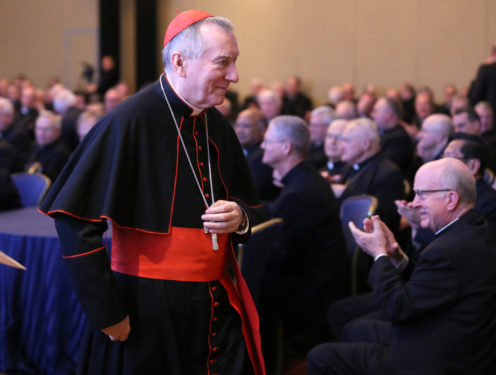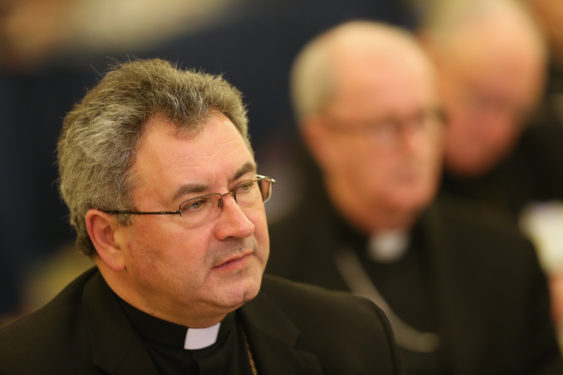By Christopher White

BALTIMORE, Md. – In his first presidential address as head of the United States Conference of Catholic Bishops (USCCB) on Monday, Cardinal Daniel DiNardo said the nation “seems more divided than ever . . . but our role continues to be witnessing to the Gospel.”
Cardinal DiNardo, without ever mentioning President Donald Trump by name, enumerated specific areas of concern, as has been reflected by the more than 200 statements released by the conference over the past year.
“Divisions over health care, conscience protections, immigration and refugees, taxes, abortion, physician assisted suicide, gender ideologies, the meaning of marriage, and all the other headlines continue to be hotly debated,” he said.
The cardinal, who serves as the Archbishop of Galveston-Houston, was elected last November for a three year-term, and received widespread applause as he spoke of the bishops’ work on behalf of the unborn and immigrants.
“Our response must be civility and love. My friends, civility begins in the womb,” said Cardinal DiNardo. “If we cannot come to love and protect innocent life from the moment God creates it, how can we properly care for each other as we come of age? Or when we come to old age?”
In a move that linked the issues of immigration to the pro-life concerns of the conference, Cardinal DiNardo added: “We join our Holy Father in declaring that a pro-life immigration policy is one that does not tear families apart; it protects families. Such a policy includes an equitable path to legal protection.”
He also mentioned the recent uptick in violence in the nation, from the recently racially motivated events of Charlottesville, Va., to the mass shooting in Las Vegas, Nev., in October that killed 59 individuals and injured over 500 others.
In one of the most pointed lines of his address, Cardinal DiNardo echoed the bishops’ recent plea for a national debate on America’s gun policies.
“The time is long past due to end the madness of outrageous weapons – be they stockpiled on a continent or in a hotel room,” he said.
At a midday press conference, the Cardinal reiterated the bishops’ long-standing “common sense” approach to guns and its desire to ban “juiced up” weapons, but failed to say whether the conference would pursue new initiatives on this front.
Nuncio Addresses Assembly
Starting off the first day of the general assembly, Archbishop Christophe Pierre, apostolic nuncio to the United States, reflected on Pope Francis’s recent remarks to CELAM, the Latin American episcopal conference, asking for bishops to possess “the passion of evangelization.”
“What are we as bishops truly passionate about?” asked Archbishop Pierre. He then proposed three areas of focus: “our youth; the mission of evangelization; and the Lord Himself.”
He said it was the task of bishops to make the faith more attractive for young people.
“The beauty of Catholicism – in art, architecture, music, and in its liturgical, spiritual and intellectual tradition – cannot be hidden but must be re-proposed,” said Archbishop Pierre.
He also said strong leadership on behalf of bishops, such as the responses to Charlottesville, is part of offering a compelling witness to the faith.
“Your strong leadership sends a message to a young people of a Church that is prophetic and filled with good-hearted people of every race and tribe!” said the archbishop.
Pope Francis named Archbishop Pierre as the apostolic nuncio to the United States in April 2016. He has worked for the Holy See’s diplomatic services since 1977, having previously served in Uganda, New Zealand, and most recently Mexico, among numerous other countries.
While warning that the challenges facing the Church and country are great, he said, “there are signs of hope – of growth – of a new springtime for evangelization. I repeat, this can be a Kairos moment for the Church in America.”
The latter part of the morning was spent with updates from the committees on divine worship, pro-life activities, migration, and the October 2018 Synod of Bishops, which will focus on young people, the faith, and vocational discernment.
Cardinal William Levada, former prefect of the Congregation for the Doctrine of Faith, questioned whether or not the preparatory document for the upcoming synod, released by Francis in January, adequately addressed the “ignorance of the faith” among young people.
In response, Cardinal DiNardo assured him that poor catechesis was a growing problem that the conference hopes is addressed by the synod next October.
Cardinal Timothy Dolan, Archbishop of New York and head of the outgoing head of the pro-life committee, highlighted the recent failures to advance physician-assisted suicide legislation as a victory for the conference but said states must continue to be vigilant on this front. He also said the conference is working with congress to pursue potential nationwide legislation on this front, including working with Democrats in congress who are not “with us on abortion,” but oppose the practice of assisted suicide.
The last time the U.S. bishops met formally was in June 2017. Many, however, were on hand for the July 2017 Convocation of Catholic Leaders in Orlando, Florida to discuss the application of Pope Francis’ 2013 apostolic exhortation “The Joy of the Gospel” in the American context.

Surprise Choice
In a surprise, Archbishop Joseph Naumann of Kansas City was selected over Cardinal Blase Cupich of Chicago as head of the U.S. bishops’ committee on pro-life activities, 96-82, during the Tuesday morning elections.
The results will likely be viewed by many that the “Francis effect” has yet to take fully hold of the U.S. Conference of Catholic Bishops and a rejection of the “consistent ethic of life” methodology, promoted by the late Cardinal Joseph Bernardin, who served as Archbishop of Chicago in the 1980s and ’90s.
This is the first time in nearly 40 years the U.S. bishops have chosen not to elect a cardinal as head of the pro-life committee.
This closely watched election has been viewed by many as a referendum on both the conference’s approach to pro-life issues and how it aligns with Pope Francis.
Archbishop Naumann’s approach to life issues has long been marked by a specific focus on abortion.
In May of this year, he made headlines when he announced that the parishes in his diocese would no longer host the Girl Scouts because of their affiliation with Planned Parenthood.
During the 2016 presidential election, Naumann took to the pages of his archdiocesan newspaper, The Leaven, to call out then-vice presidential candidate Senator Tim Kaine, a Catholic, for being personally opposed to abortion, yet failing to maintain those convictions in the political realm.
Also elected was Archbishop Allen Vigneron of Detroit as conference secretary-elect for the conference. Archbishop Joseph Kurtz of Louisville, Ky., was chosen as head of the committee on religious liberty; Bishop Michael Burbidge of Arlington, Va., as head of the committee on communications; Bishop Nelson Pérez of Cleveland, Ohio, as head of the committee Cultural Diversity in the Church; Bishop Kevin Rhodes of Fort Wayne-South Bend as head of the committee on doctrine; and Bishop Joseph Cistone of Diocese of Saginaw as head of the committee for national collections.
Budget Approved
Before the close of their meeting on Tuesday, the U.S. bishops approved the budget for their restricted and unrestricted funds for 2018 in a 125-4 vote, with three abstentions. Passage required a majority of members present.
They also narrowly approved a three percent increase in the diocesan assessment for 2019 by a vote of 136-31, with five bishops abstaining. With 197 diocesan and eparchial heads in the United States, the vote required approval by two-thirds, or 132 of them.
The matter was voted on by paper ballot after an electronic balloting malfunction forced the bishops to resort to paper balloting for the rest of the day Nov. 14, the second day of their annual fall general assembly in Baltimore.
The bishops had voted down a request last year to increase the assessment, noted Archbishop Dennis M. Schnurr of Cincinnati, who is treasurer of the U.S. Conference of Catholic Bishops and chairman of the USCCB Committee on Budget and Finance.
As a result, he said, “the staff worked diligently over several weeks … to balance the budget – cutting programs and travel, cutting building maintenance” and curtailing wages “below market value for the D.C. area. It’s a tight, balanced, unrestricted-funds budget.”
The unrestricted funds budget, and the restricted funds budget, taken together, garnered 95 percent support in the last electronic ballot accepted that morning, passing 125-4, with three abstentions. Approval was contingent on a majority of the bishops present and voting.
In arguing for an assessment increase, Archbishop Schnurr said it would make about $350,000 available for budgeting for 2019. While one year of deferred maintenance may not do harm, he added, “multiple years will carry additional costs as aging systems fail,” which only “compounds through the years.”
The tighter 2018 budget “may have impacted your committee’s abilities to carry out its respective mandates,” Archbishop Schnurr said. The increase in the assessment, he argued, will make the USCCB “better able to fulfill the 2017-2020 strategic plan approved by the bishops.”
Contributing to this story was Mark Pattison of CNS in Baltimore.
